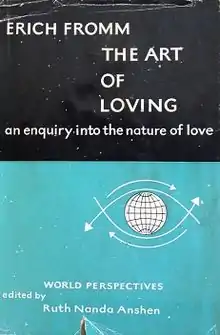The Art of Loving
The Art of Loving is a 1956 book[1][2] by psychoanalyst and social philosopher Erich Fromm, which was published as part of the World Perspectives series[3] edited by Ruth Nanda Anshen. In this work, Fromm develops his perspective on human nature from his earlier works, Escape from Freedom and Man for Himself – principles which he revisits in many of his other major works.
 Cover of the first edition | |
| Author | Erich Fromm |
|---|---|
| Language | English |
| Publisher | Harper & Brothers |
Publication date | 1956 |
| Media type | |
| Pages | 133 |
Fromm presents love as an activity, a skill that can be taught and developed, rejecting the idea of love as a magical and mysterious sensation that cannot be analyzed and explained. He focuses on love as a permanent state of being, as opposed to the short-lived experience of "falling in love" or being helpless in the face of love.[4]
Fromm calls the desire for interpersonal fusion the most powerful striving in humans. He argues that love is the only rational answer to our need to overcome separateness, which he sees as the fundamental problem of human existence.
Fromm says that modern humans are alienated from each other and from nature, and we seek refuge from our lonesomeness in romantic love and marriage. However, Fromm observes that real love "is not a sentiment which can be easily indulged in by anyone." It is only through developing one's total personality to the capacity of loving one's neighbor with "true humility, courage, faith and discipline" that one attains the capacity to experience real love. This should be considered a rare achievement.
The Art of Loving argues that the active character of true love involves four basic elements: care, responsibility, respect, and knowledge. Each of these is difficult to define and can differ markedly depending on the people involved and their circumstances. Seen in these terms, love is hard work, but it is also the most rewarding kind of work.
One of the book's concepts is self-love. According to Fromm, loving oneself is quite different from arrogance, conceit or egocentrism. Loving oneself means caring about oneself, taking responsibility for oneself, respecting oneself, and knowing oneself (e.g. being realistic and honest about one's strengths and weaknesses). In order to be able to truly love another person, one needs first to love oneself in this way.
Fromm calls the general idea of love in contemporary Western society égoïsme à deux – a relationship in which each person is entirely focused on the other, to the detriment of other people around them. The current belief is that a couple should be a well-assorted team, sexually and functionally, working towards a common aim. This is in contrast with Fromm's description of true erotic love and intimacy, which involves willful commitment directed toward a single unique individual. One cannot truly love another person if one does not love all of mankind including oneself.
The book includes explorations of the theories of brotherly love, motherly and fatherly love, erotic love, self-love, and the love of God, and an examination into love's disintegration in contemporary Western culture.
Fromm explains what he calls "paradoxical logic"—the ability to reconcile opposing principles in one same instance. He highlights paradoxical logic in the chapters dedicated to the love of God and erotic love.
Fromm begins the last chapter, "The Practice of Love", by saying: "[...] many readers of this book, expect to be given prescriptions of 'how to do it to yourself' [...]. I am afraid that anyone who approaches this last chapter in this spirit will be gravely disappointed". He says that in order to master the art of loving, one must practice discipline, concentration, and patience in every facet of one's life.
References
- The Art of Loving (1956) by Erich Fromm. Harper & Row. ISBN 978-0-06-091594-0.
- Fromm, Erich (1956) "The art of loving" First Perennial Library edition published 1974. ISBN 0-06080291-X. Paperback, 118 pages.
- "World Perspectives Series List". World Perspectives Series. Library Thing. Retrieved Dec 1, 2011.
- "falling" in love, the sudden collapse of the barriers which existed until that moment between two strangers ... this experience of sudden intimacy by its very nature short-lived. - Erich Fromm. The Art of loving (Kindle Locations 679-682).